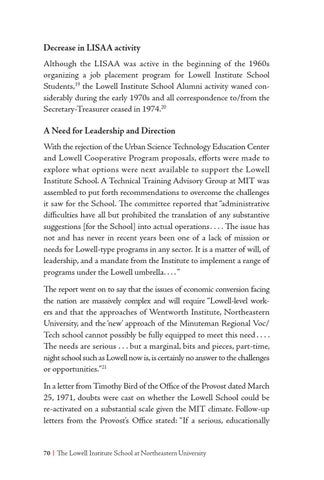Decrease in LISAA activity Although the LISAA was active in the beginning of the 1960s organizing a job placement program for Lowell Institute School Students,19 the Lowell Institute School Alumni activity waned considerably during the early 1970s and all correspondence to/from the Secretary-Treasurer ceased in 1974.20 A Need for Leadership and Direction With the rejection of the Urban Science Technology Education Center and Lowell Cooperative Program proposals, efforts were made to explore what options were next available to support the Lowell Institute School. A Technical Training Advisory Group at MIT was assembled to put forth recommendations to overcome the challenges it saw for the School. The committee reported that “administrative difficulties have all but prohibited the translation of any substantive suggestions [for the School] into actual operations. . . . The issue has not and has never in recent years been one of a lack of mission or needs for Lowell-type programs in any sector. It is a matter of will, of leadership, and a mandate from the Institute to implement a range of programs under the Lowell umbrella. . . . ” The report went on to say that the issues of economic conversion facing the nation are massively complex and will require “Lowell-level workers and that the approaches of Wentworth Institute, Northeastern University, and the ‘new’ approach of the Minuteman Regional Voc/ Tech school cannot possibly be fully equipped to meet this need . . . . The needs are serious . . . but a marginal, bits and pieces, part-time, night school such as Lowell now is, is certainly no answer to the challenges or opportunities.”21 In a letter from Timothy Bird of the Office of the Provost dated March 25, 1971, doubts were cast on whether the Lowell School could be re-activated on a substantial scale given the MIT climate. Follow-up letters from the Provost’s Office stated: “If a serious, educationally
70 l The Lowell Institute School at Northeastern University
